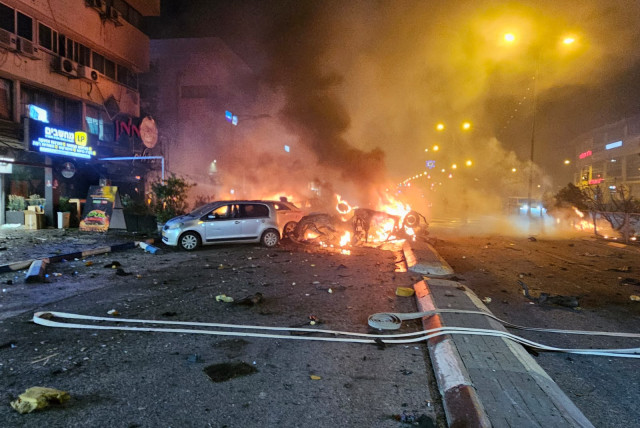A woman's close brush with death from a Hamas rocket near Jerusalem - opinion

When Cohen is four steps from the protective building, she hears a terrifying boom and is lifted off the ground by the concussive wave. A rocket from Gaza had struck.
Ronit Cohen, 53, was headed to her day job, which is actually a night job.
She serves as the balanit, attendant, of a mikve, a ritual bath in Betar Illit, a suburb of Jerusalem. Mikve attendant is one of the few paid jobs for women in the religious world, and in addition to supervising the ritual, the attendant becomes an adviser and confidante to the women she attends.
Cohen loves her job, and she likes to get to the mikve early to help women with their preparation. She takes the bus from her home in Betar Illit. Or she did, until October 9.
Rockets in Jerusalem: The Israel-Hamas war changed everything
Despite the early missile warnings in the Jerusalem area when Operation Swords of Iron began, the 5 p.m. bus on Monday is very crowded.
Sunset is 6:14 p.m., the earliest time the women she attends can complete their preparations and immerse. Cohen generally prefers the seat near the steps in the middle of the bus so she can get off quickly. That evening, every seat is taken, except one in the far back of the bus. The windows are closed. The aisles are filled with baby carriages and teenagers’ backpacks. The babbling of babies and chatter of travelers make phone conversations difficult. On her screen, Cohen sees that her daughter Rivka, 27, is calling. “What did you say?” Cohen asks. It’s hard to hear.
Rivka shouts this time. “Ima, there’s an alarm! Azaka!”
No one on the bus has heard the siren that marks a code red rocket alert.
A rocket from Gaza could be falling in their area.
Cohen usually speaks in the soft, sensitive, and reassuring tone with which, in her professional capacity, she reassures women and responds to their questions. She’s not prone to screaming.
But now she finds her loudest voice. “Azaka, azaka!” She surprises herself and all the passengers with the volume.
Even the driver way up front hears her. He takes that voice seriously. He turns his wheel and swerves, pulling the bus to the side of Elazar Hamoda’i Street. There’s a building with a roof overhang. Passengers rush out and huddle beneath it.
Cohen is the last off. Ahead of her is a mother of 11 children and her youngest son, 11. They are on their way to buy the final accouterments for an older son’s wedding that week.
When Cohen is four steps from the protective building, she hears a terrifying boom and is lifted off the ground by the concussive wave.
She feels piercing agony in her right leg as if it is on fire. She grabs hold of her leg under her long skirt and prays that “God would not leave my four children without their mother.”
Cohen can’t move, and she’s bleeding hard. Men and women from the bus rush forward to try to staunch the bleeding and assure her that everything will be all right.
Around her, the windows of the nearby buildings are shattered. The stench of scorched rubber rises from a burning car.
Then there’s the roar of a motorcycle. A medic from Hatzalah kneels and bandages her leg. Next comes a Magen David Adom crew who lift Cohen into an ambulance and turn on their siren. She and the 11-year-old boy and his mother are taken to Hadassah Ein Kerem.
“Thinking back, it seems silly now that I actually asked the ambulance driver if he could stop at my home and pick up my daughters Hedva and Rivka from our home,” says Cohen. “He said, ‘Lady you are bleeding – no stops on the way to the hospital. Your daughters will figure out what happened,’” she adds.
“The next thing, I knew I was in the trauma center with 13 doctors and nurses around me,” she says. “I remember getting an infusion and a tetanus shot and being moved for imaging.”
Her leg sustained serious trauma from her fall and from the propelled shrapnel.
After a month and a half of hospitalization, she was able to go home and become a day patient in the rehabilitation center at Hadassah Mount Scopus.
“At first, the pain was so excruciating that if the doctors or nurses even touched me lightly, I screamed,” she says. “Slowly, the therapy helped and the pain lessened. I was able to put weight on my leg. Now I can get around with a walker.”
The physical pain is just part of it. “When you experience something traumatic and painful, you think, ‘Why me?’ It hurts so much. You feel sorry for yourself. Only afterward, in a conversation with my rabbanit, did I start looking at my situation differently. I realized that I was able to save the bus full of passengers while sounding the alarm.”
Recuperating in the hospital, Cohen learned that the same rocket barrage landed on a mosque in the Arab suburb of Jerusalem Abu Ghosh. A 20-year-old man was wounded and later died.
Shrapnel had sliced through the abdomen of the 11-year-old boy, all the way to his back. He underwent surgery and would recover after several weeks in intensive care. He managed to watch his brother’s wedding from his hospital bed via a TV hook-up. The mother, unhurt, walked down the aisle with the bride and her mother.
“In my work at the mikve, there’s a belief that when I say amen to the woman’s blessing, the angels in heaven above also answer amen, not just me, “ says Cohen. “ I feel as if I was getting a heavenly message on that bus, too.
“When we lit Hanukkah candles at home with my family around me, I thanked God not only for the miracles of the past. I knew I was saying thanks for my personal miracle and for the privilege of relaying the warning to the bus driver.
“With God’s help, I’m hoping soon to get back on the bus to the mikve and to hear all those heavenly echoes to my amens.”
The writer is the Israel director of public relations at Hadassah, the Women’s Zionist Organization of America. Her latest book is A Daughter of Many Mothers.
Jerusalem Post Store
`; document.getElementById("linkPremium").innerHTML = cont; var divWithLink = document.getElementById("premium-link"); if (divWithLink !== null && divWithLink !== 'undefined') { divWithLink.style.border = "solid 1px #cb0f3e"; divWithLink.style.textAlign = "center"; divWithLink.style.marginBottom = "15px"; divWithLink.style.marginTop = "15px"; divWithLink.style.width = "100%"; divWithLink.style.backgroundColor = "#122952"; divWithLink.style.color = "#ffffff"; divWithLink.style.lineHeight = "1.5"; } } (function (v, i) { });

